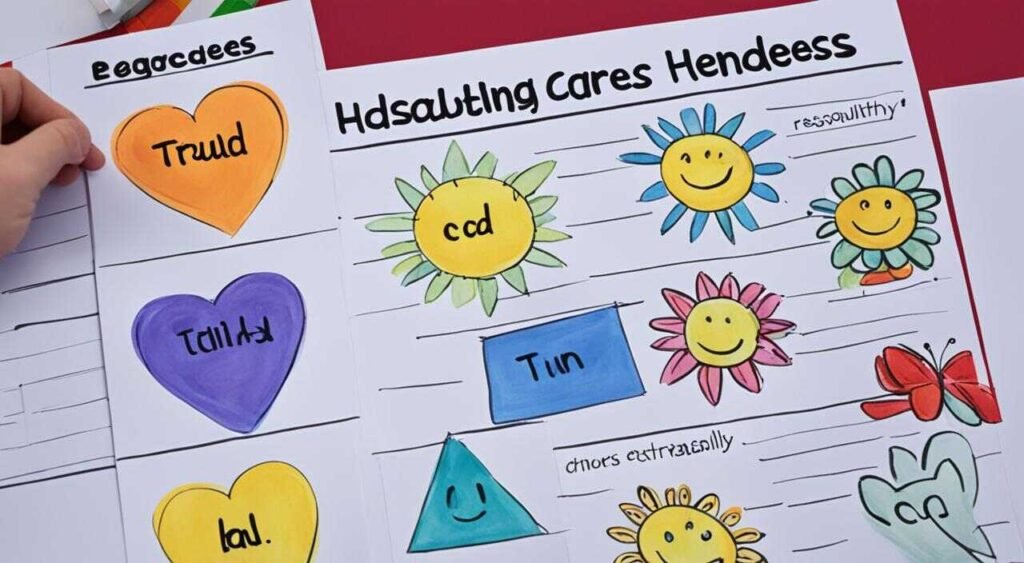Being a successful and happy adult starts with learning important lessons as a child. As a parent of a teenager, I know how important key lessons like character traits, life skills, and emotional intelligence are. This article shares 11 crucial life lessons. They can help shape children into caring, strong, and capable people. These include how to be resilient, have empathy, take responsibility, show respect, give kindness, value honesty, handle time well, solve problems, feel gratitude, talk well, and have patience.
Key Takeaways
- Instilling essential character traits, life skills, and emotional intelligence in children is crucial for their overall growth and development.
- Resilience, empathy, responsibility, and respect are among the 11 key life lessons explored in the article.
- Developing strong critical thinking and problem-solving skills can help children navigate life’s challenges with confidence.
- Fostering emotional intelligence, including healthy communication and patience, is vital for a child’s well-being and relationships.
- The article provides a comprehensive guide to the most important things for a child to learn, equipping parents and caregivers with the knowledge and strategies to support their child’s growth.
Building a Strong Foundation for Character Development
To build a child’s character, start with respect and patience. Teach kids how to understand and manage their feelings. Create a safe, stable home for them to grow and reach their dreams.
Treating Your Child with Respect and Patience
Respecting kids forms the basis for their mental well-being and confidence. Valuing their needs teaches them to do the same for others. This respect creates a safe place for them to know themselves and their emotions better.
Modeling Self-Reflection and Emotional Awareness
Showing self-reflection and emotional awareness is key for children. Talking about feelings helps them learn healthy ways to cope. This wisdom is the beginning of strong connections and understanding others.
Creating a Safe and Secure Home Environment
A safe home is crucial for kids to grow. Feeling secure and loved, they dare to try and learn. This loving setting helps them bounce back from challenges and prepares them for a successful future.
Fostering Essential Life Skills
Fostering essential life skills in kids is very important for their growth. This piece looks at three crucial ones. These are resilience and perseverance, empathy and compassion, and responsibility and accountability.
Resilience and Perseverance
Resilience and perseverance are key for kids to handle life’s challenges. By teaching these skills, we help children deal with setbacks. They can overcome hurdles and pursue their dreams. Resilience allows them to face change and tough times head-on. On the other hand, perseverance gives them the grit to never give up, no matter what they face.
Empathy and Compassion
Teaching empathy and compassion helps children connect and care about others. When they imagine another’s feelings, they gain a better understanding of people’s lives. This helps them act kindly, fostering better friendships and community involvement.
Responsibility and Accountability
It’s crucial to teach kids responsibility and accountability to guide their actions. Showing them to be responsible for their choices makes them more aware of the results. This makes them reliable and honest people.
By instilling these skills in kids, we prepare them for life. They learn to handle challenges, relate well with others, and be strong, caring citizens.
What is the most important thing for a child to learn?
We often think about the most vital lessons for our kids. Three things are especially crucial: respect for others and self, kindness and generosity, and honesty and integrity.
Respect for Others and Self
Respect starts with yourself and others. It brings dignity and empathy, helping kids set good boundaries. Respecting others’ rights, opinions, and space is key to being sensitive and mature in life.
Kindness and Generosity
Kindness and generosity make life better for everyone involved. They help kids see the world in a positive light. Kids who give become happier, finding joy in helping others, big or small.
Honesty and Integrity
Honesty and integrity build trust and strong friendships. They teach kids to be truthful and reliable. Growing up, this helps them become respected people in their communities.
Teaching values like respect, kindness, honesty, and integrity is key to a good life. These principles give kids the tools they need to face the world. They learn to act with courage, understand others, and always strive to do what’s right.
Developing Critical Life Competencies

The article highlights the need to teach kids essential life skills. These focus on time management and prioritization, problem-solving and critical thinking, and gratitude and appreciation.
Time Management and Prioritization
Teaching time management helps kids balance tasks and use their time wisely. It shows them how to pick the most important tasks, avoid putting things off, and meet their goals. This skill is key for their success.
Problem-Solving and Critical Thinking
Developing problem-solving skills helps children take on issues with creativity and certainty. It lets them look at issues from different sides, think of new ways to solve them, and pick the best solutions. These skills ready them for the challenges they will face in the future.
Gratitude and Appreciation
Learning to be grateful and appreciative builds a positive mindset and life joy. It helps kids see the good in what they have, leading to a deeper sense of happiness. This is crucial for a child’s well-being.
| Critical Life Competency | Description | Benefits |
|---|---|---|
| Time Management and Prioritization | Developing the ability to balance responsibilities and make the most of time | Promotes discipline, organization, and the achievement of goals |
| Problem-Solving and Critical Thinking | Cultivating the skills to analyze problems from multiple angles and consider alternative solutions | Empowers children to navigate challenges with confidence and creativity |
| Gratitude and Appreciation | Cultivating a positive mindset and a sense of life satisfaction by teaching thankfulness | Fosters a deeper understanding of the value of what one has and a more fulfilling outlook on the world |
Nurturing Emotional Intelligence
Understanding and managing our own feelings, plus those of others, is key. It’s very important for kids to learn this skill. To do that, we focus on healthy communication skills and patience and tolerance.
Healthy Communication Skills
Talking well helps us make good friends, solve problems, and share how we feel. By showing kids how to talk about their emotions nicely, we help them understand other people’s feelings. This makes it easier to make friends and figure out problems together.
Embracing Patience and Tolerance
Quick results are often valued today. But it’s vital to teach kids to be patient and tolerant. These skills help kids face tough times and bounce back well. By being patient with themselves and others, kids learn to look after each other. This makes them strong and caring. Such strengths help them their whole life.
We are giving children valuable tools for success by teaching emotional intelligence. This includes communicating well and being patient and caring. These are vital parts of growing up well and meeting life head-on with courage and kindness.
Conclusion
This article has shown why it’s crucial to teach kids key life lessons early on. How do we do this? By teaching values like respect, kindness, and honesty. These make the children ready for life’s challenges and help them have a happy life.
The article serves as a detailed guide for parents and caregivers. It tells them what’s most important for kids to learn. It covers everything from building character to emotional intelligence. This guide helps create strong, caring, and successful individuals.
The lessons shared here are vital for both short- and long-term success. They prepare kids to thrive in the future. We must focus on these lessons to help the next generation do well and change the world for the better.
FAQ
What is the most important thing for a child to learn?
For children, learning to respect others and themselves is vital. Being kind and generous is also key. They should learn the value of honesty and integrity. These values prepare them for a rich, meaningful life.
What are the essential life skills a child should develop?
Kids should learn resilience and how to keep trying. They should understand and share other people’s feelings. They also need to learn to take responsibility. These skills guide them through life’s challenges, help them connect meaningfully, and shape their morals.
How can parents build a strong foundation for their child’s character development?
To help their child grow, parents should show respect and be patient with them. It’s important for parents to model thinking about their actions and to notice their feelings. Creating a safe, loving home is critical. This gives children the support they need to do well.
What critical life competencies should children develop?
Children should learn how to manage their time and prioritize tasks. They need problem-solving and critical thinking skills. It’s also important to teach them the value of being thankful. These abilities help children balance duties, solve problems effectively, and keep a positive outlook.
Why is nurturing emotional intelligence important for children?
Growing emotional intelligence is key to a child’s well-being and success. It involves learning to communicate well and having patience and understanding. This helps children build strong bonds and cope with life’s hurdles.





